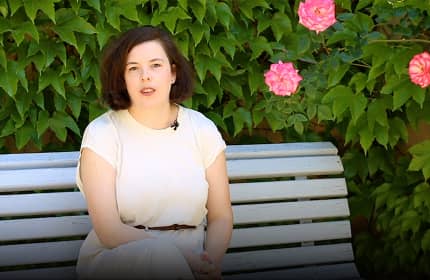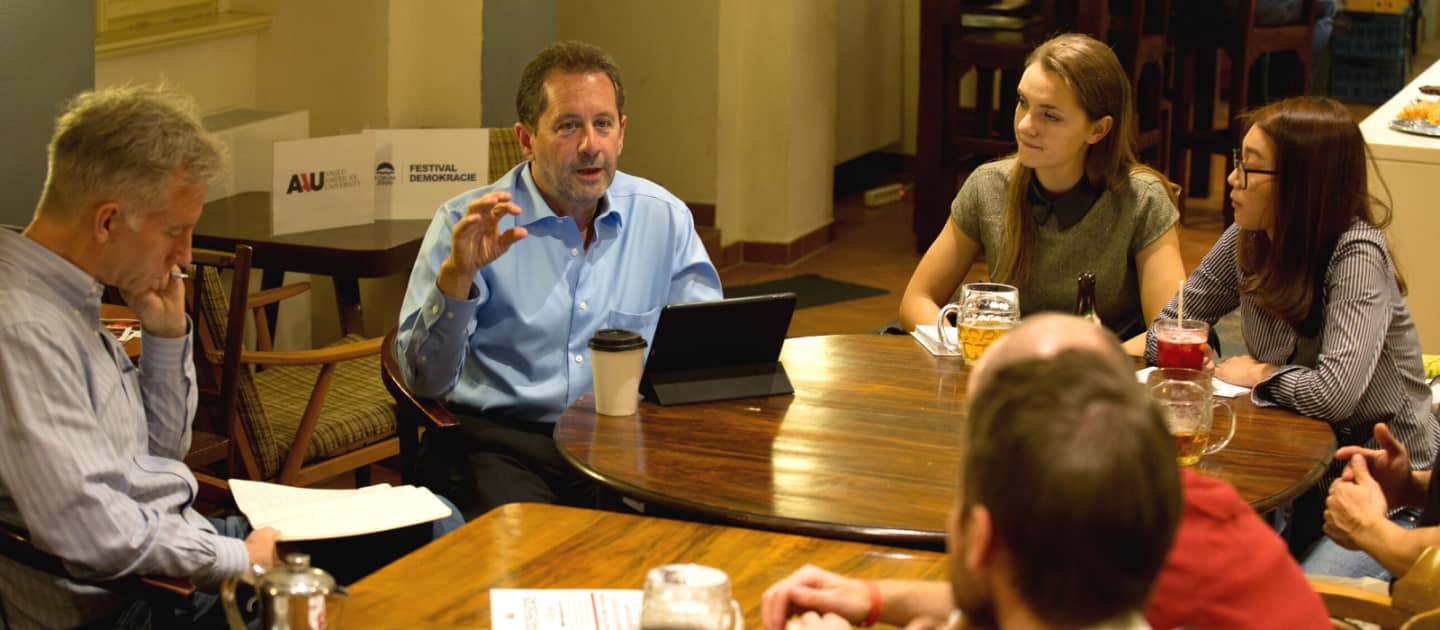
International Relations: Political History of Central and Eastern Europe
The Bachelor of Arts in International Relations: Political History of Central and Eastern Europe offers the student a modern and interdisciplinary education in international relations with a concentration in the political history of Central and Eastern Europe. Graduates receive a globally recognized degree, accredited in the US and EU, and earn it in three years instead of four.

| Accreditation | WASC + NABHE |
| Degree | Bachelor of Arts |
| Duration | 3 years |
| Location | Prague, CZ |
| Tuition EU | 31 781 USD |
| Tuition NON-EU | 36 679 USD |
| Intake | Fall / Spring |
| Deadline | Rolling Admission |
About the program
The B.A. in International Relations: Political History of Central and Eastern Europe program at Anglo-American University is delivered by a faculty of experts from all over the world that bring years of professional experience to the classroom. This program enables students to fully experience the cultural dynamism of Central Europe. Students can expect to gain a solid background in international relations and political theory, history, philosophy, nationalism, or security.
Political History of the CEE region is an interdisciplinary specialization combining historical context with present-day politics. The courses offered provide a deeper insight into the imperial history of the CEE countries, its aftermath, and especially into the legacies of authoritarian regimes, be it on general, Jewish population, or on general post-Cold War socio-political transformation.
Upon completion, our students acquire the ability to critically examine and address the international/intercultural challenges of our time, such as global inequalities, economic dependency, conflict and security, or globalization including the evolving roles of organizations such as the United Nations, NATO and the European Union.
Veronika Bartáková, B.A. International Relations, Russia“AAU makes networking incredibly easy to do. I was able to participate in various events that don’t necessarily connect to my coursework—conferences, literature festivals, debates, lectures, etc. AAU has helped me and my club get in touch with event-organisers, which, for example, allowed us to host an event during the Festival of Democracy organised by the famous Forum 2000 conference.”
Beyond the classroom you can join student clubs like Diplomacy or Model UN, practice your debate skills at a faculty-student debate or discuss current political issues with professors and local experts at an event like ‘Professors in the Pub’.

AAU’s Career Center also connects students with numerous professional internships in the Czech Republic and abroad every year.
Program Structure
International Relations: European Studies is a 3-year study program. To graduate, students must accumulate 90 US credits (180 ECTS credits) by completing 30 courses.
Below, you can find a list of courses and modules for the International Relations (major) with Political History of Central and Eastern Europe concentration.
Note: Approx. 12–15 students need to be enrolled in order to run a “concentration” module.
For more information on the modular structure and the study program, please contact our admissions team at admissions@aauni.edu.
Learning Outcomes
Graduates of the B.A. in International Relations: Political History of Central and Eastern Europe can expect to:
- Discuss and debate basic theories, levels of analysis and empirical evidence used in relevant scholarly literature.
- Apply theory to compare and contrast the meanings and functions of political institutions in different political systems and explain the outcomes and performance of political processes.
- Apply theory to understand the workings of the global economy, and to assess the role of businesses, governments, and international organizations.
- Apply theory to understand history and current events in international relations.
- Apply theory to understand European integration history, institutions, and policy.
Career Prospects
AAU graduates thrive in multinational environments and are able to communicate professionally in English to international audiences. As a graduate of this degree program, you will be well equipped to continue your studies or pursue a global career in areas such as:
- Diplomacy
- Cultural Management
- Social Research and Publishing
- Reporting and Administration
- Public Service
- Humanitarian Government or NGO’s
Qualification Awarded
The Bachelor’s degree awarded is concurrently recognized as a Bachelor of Arts (B.A.) in the United States, per AAU’s accreditation by the WASC Senior College and University Commission, and as a Bakalář (Bc.) in the Czech Republic, per AAU’s accreditation by the National Accreditation Bureau for Higher Education (NABHE). Graduates may select whether to use the U.S. post-nominal or the Czech pre-nominal title.
This concentration is accredited by the National Accrediting Bureau for Higher Education. Its completion will be indicated on the transcript, diploma, and diploma supplement.
Financial Aid and Scholarships
We provide a wide range of scholarships, tuition discounts, and financial aid options to help make quality education more accessible. To learn please visit our dedicated Financial Aid and Scholarships page.
Additional information
- Learn more about tuition & payment.
- Learn more about undergraduate admission requirements.
- Explore our FAQ section.
- Should you have any further questions please email us at admissions@aauni.edu.
See what our students have to say
I enjoy classes at AAU, especially political philosophy because it is teaching me how to communicate in social communities and this skill could be used both in daily life and in business. Plus, our professor is amazing. I’ve never seen such a charismatic and interesting person who dives fully into the subject of every lesson.

International Relations, Kazakhstan
AAU makes networking incredibly easy to do. I was able to participate in various events that don't necessarily connect to my coursework like conferences, literature festivals, debates, lectures, etc. When I was President of the Diplomatic Club, AAU helped me get in touch with event-organizers, which, for example, allowed us to host an event during the Festival of Democracy organized by the famous Forum 2000 conference.

International Relations, Czech Republic
Meet the people


George Hays, Ph.D.
Chair of the Department of International Relations and Diplomacy, Lecturer george.hays@aauni.eduDo you have questions?
We are happy to help!
Ask us a question!


